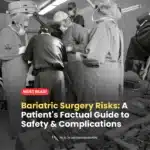Types of Bariatric Surgery: A Patient’s Guide to Your Weight Loss Options
Welcome to our expert guide on the types of bariatric surgery. If you are starting your journey into weight loss surgery, you have likely discovered that there are several different procedures. Understanding the difference between a gastric sleeve, a gastric bypass, and other options can feel overwhelming.
This page is designed to be a clear, simple, and educational resource. We will explain the most common and effective types of bariatric surgery, how they work, and their pros and cons. Making an informed decision is the most important first step. Our expert team is here to help you understand these options and provide personalized surgical solutions tailored to your unique health needs.
Free WhatsApp Consultation:
Contact us now! 👉 +90 530 489 94 74
Our patıents
Meet Some of Our Patients Who Underwent Bariatric Surgery



What Is Bariatric Surgery? A Simple Explanation
Bariatric surgery is the medical “umbrella term” for a group of weight loss surgery procedures. These are not cosmetic surgeries. They are powerful, medically-proven interventions for the chronic disease of severe obesity. The primary goal is not just weight loss, but “health gain”—to dramatically improve or send obesity-related health conditions into remission.
Modern bariatric surgery is almost always performed laparoscopically (also known as “keyhole surgery”). This minimally invasive technique uses 3-5 small incisions, a tiny camera, and long, thin tools. This means less pain, minimal scarring, and a much faster recovery time for you.
These procedures are so effective because they work in two main ways at once:
- Restriction: The surgery makes your stomach smaller, physically limiting the amount of food you can eat in one sitting. This helps you feel full much more quickly.
- Hormonal/Metabolic: This is the most powerful part. The surgery changes your gut hormones. Specifically, it often involves removing or bypassing the part of the stomach that produces ghrelin, the “hunger hormone.” With less of this hormone, your constant, nagging hunger is significantly reduced.
As a surgeon with over two decades of experience, Prof. Dr. Karatepe often explains that bariatric surgery is like resetting your body’s appetite and metabolic system, allowing it to work more efficiently for you, not against you.
What is the most common type of bariatric surgery?
The most common type of bariatric surgery performed worldwide today is the Sleeve Gastrectomy (also called the Gastric Sleeve). It has become the most popular choice because it offers excellent weight loss results with a lower risk of long-term nutritional complications compared to other procedures.
Free WhatsApp Consultation:
Contact us now! 👉 +90 530 489 94 74
Comparing the Common Types of Bariatric Surgery
There are several types of bariatric surgery, but the two most common and effective “gold standard” procedures performed today are the Sleeve Gastrectomy and the Roux-en-Y Gastric Bypass. An expert surgeon will help you decide which is the safest and most effective option for your specific health needs.
Type 1: The Sleeve Gastrectomy (Gastric Sleeve)
This is the procedure that Prof. Dr. Karatepe specializes in and is the most frequently performed weight loss surgery globally.
- What it is: A surgeon laparoscopically removes about 75-80% of the stomach. The remaining stomach is a narrow, banana-shaped “sleeve.” This procedure is irreversible as the portion of the stomach is permanently removed.
- How it works: It works through both Restriction (your new stomach holds much less food) and Hormonal Change (the removed part of the stomach was responsible for producing the “hunger hormone,” ghrelin, so your appetite is dramatically reduced).
- Pros: It is a simpler, faster operation than a bypass. It does not re-route your intestines, which means a lower risk of nutritional deficiencies (like B12 or iron) and no “dumping syndrome” (a negative reaction to sugar). The weight loss and health resolution (especially for high blood sugar) are excellent.
- Cons: It is irreversible. It can also cause new or worsened acid reflux (GERD) in some patients. Like all bariatric procedures, you must take vitamins for life.
Type 2: The Roux-en-Y (Gastric Bypass)
This procedure has been performed for decades and is considered a “gold standard” for bariatric surgery, especially for patients with severe high blood sugar (type 2 diabetes).
- What it is: A surgeon creates a very small stomach pouch (about the size of an egg) and then “bypasses” the rest of the stomach and the first part of the small intestine. The surgeon attaches the new, small pouch directly to a lower part of the small intestine.
- How it works: It is Restrictive (the tiny pouch holds very little food) and Malabsorptive (by bypassing part of the intestine, your body absorbs fewer calories and nutrients from the food you eat).
- Pros: It typically leads to slightly faster weight loss in the first year and is considered the most powerful surgery for reversing type 2 diabetes.
- Cons: It is a more complex operation than the gastric sleeve. It carries a high risk of “dumping syndrome” (feeling very sick after eating sugar) and a much higher risk of lifelong nutritional deficiencies in iron, B12, and calcium. It also has a slightly higher risk of long-term internal complications.
Other Bariatric Procedures
You may hear about other types, though they are less common. The Adjustable Gastric Band (Lap-Band) is an older procedure that is rarely performed today due to its lower effectiveness and high rate of re-operation. The Duodenal Switch is an even more complex, powerful procedure (combining a sleeve with a long bypass) that is typically reserved for patients with a very high BMI (over 50-60).
What is the safest bariatric surgery?
While all surgery has risks, the Sleeve Gastrectomy (Gastric Sleeve) is generally considered to have a lower risk of complications and a simpler recovery compared to the gastric bypass. This is because it is a simpler procedure that does not involve re-routing the intestines, which reduces the risk of long-term nutritional and internal issues.
Why Choose Prof. Dr. Oguzhan Karatepe for Your Bariatric Surgery?
With over 25 years of experience, thousands of successful cases, and expertise in robotic and laparoscopic surgery, Prof. Dr. Karatepe is a leading figure in gastric sleeve procedures. When you are choosing a surgeon for your bariatric surgery, experience is the single most important factor for your safety and success.
A “high-volume” surgeon—one who has performed over 3,000 successful surgeries like Prof. Dr. Karatepe—is statistically proven to have lower complication rates, safer procedures, and better patient outcomes. His expertise in advanced laparoscopic and robotic surgery means your gastric sleeve is performed using the most modern, minimally invasive techniques available. This translates to real patient benefits:
- Less post-operative pain
- A shorter and more comfortable hospital stay
- Minimal gastric sleeve scars
- A faster gastric sleeve recovery
Furthermore, as a Professor of Surgery with hundreds of academic publications, Prof. Dr. Karatepe is not just a practitioner; he is an academic authority who is at the forefront of the latest, safest techniques. This is why patients from around the world who are researching the “best bariatric surgeon in Turkey” choose our clinic. Our expert team is here to help you, and we are proud to provide personalized surgical solutions at a world-class standard.
How to choose the right bariatric surgeon?
Bariatric surgery is performed by a bariatric surgeon, who is a general surgeon with specialized fellowship training in weight loss procedures. When choosing, you must look for extensive experience (1,000+ surgeries), board certification, and a surgeon who operates in an accredited (e.g., JCI) hospital.
Free WhatsApp Consultation:
Contact us now! 👉 +90 530 489 94 74

Frequently Asked Questions (FAQ) About Types of Bariatric Surgery
Q: What is bariatric surgery?
A:Bariatric surgery is the medical term for weight loss surgery. It is a group of procedures, like the gastric sleeve, that help you lose weight by making changes to your digestive system’s size and hormones.
Q: What is the difference between gastric sleeve and gastric bypass?
A: A gastric sleeve only involves reducing the size of the stomach. A gastric bypass creates a small stomach pouch *and* re-routes the small intestine. The sleeve is a simpler procedure with a lower risk of nutritional deficiencies and no “dumping syndrome.”
Q: Who qualifies for bariatric surgery?
A: Generally, you are an eligible candidate if you have a Body Mass Index (BMI) of 40 or higher, or a BMI of 35 to 39.9 with at least one serious obesity-related health condition, such as high blood sugar or high blood pressure.
Q: Is bariatric surgery safe?
A: Yes, modern laparoscopic bariatric surgery is extremely safe. When performed by a high-volume, expert surgeon, the risk of serious complications is very low (less than 1-2%). The long-term risks of *not* treating severe obesity are far higher.
Q: How much weight will I lose?
A: This depends on the type of bariatric surgery. For a gastric sleeve, most patients lose 60% to 70% of their excess body weight within the first 12 to 18 months.
Q: What is the recovery time?
A: Because these surgeries are laparoscopic, recovery is fast. Most gastric sleeve patients stay in the hospital for 2-3 nights and can return to a desk job or light activities in 2 to 4 weeks.
Q: Is bariatric surgery reversible?
A: This depends on the type. The gastric sleeve is irreversible because the majority of the stomach is permanently removed. A gastric bypass is technically reversible, but it is a very complex and high-risk operation to do so. A gastric band is reversible.
Q: What is “dumping syndrome”?
A: Dumping syndrome is a common side effect of gastric bypass (but *not* gastric sleeve). It is a negative reaction (nausea, cramping, diarrhoea, dizziness) that happens when high-sugar foods are “dumped” too quickly from the stomach pouch into the small intestine.
Q: Will I have loose skin after bariatric surgery?
A: Loose skin is a very common side effect of *massive weight loss* (from any method), not a side effect of the surgery itself. The amount of loose skin you have will depend on your age, genetics, and total weight lost.
Q: Do I have to take vitamins for life?
A: Yes. This is a non-negotiable part of your new life for all types of bariatric surgery. Because you are eating less (and absorbing less, in a bypass), you must take bariatric-specific vitamins every day for the rest of your life to prevent serious nutritional deficiencies.
Q: Will I lose my hair after my bariatric surgery?
A: Many patients (about 30-40%) experience temporary hair shedding (telogen effluvium) 3-6 months after surgery. This is a normal response to rapid weight loss and is not permanent. It is minimized by hitting your protein and vitamin goals.
Q: How long does the surgery take?
A: A laparoscopic gastric sleeve is a very efficient procedure in the hands of an expert like Prof. Dr. Karatepe, typically taking 60 to 90 minutes. A gastric bypass is more complex and takes longer, usually 2-3 hours.
Q: What is the diet like after bariatric surgery?
A: You will follow a 4-stage post-op diet, starting with clear liquids, then full liquids/purees, then soft foods, and finally, solid foods (around week 7). This phased approach is critical for letting your new stomach heal.
Q: Why choose Turkey for bariatric surgery?
A: Patients choose Turkey to access world-class, highly experienced surgeons (like Prof. Dr. Karatepe) in JCI-accredited hospitals at a fraction of the cost in the US, UK, or Australia. It is a high-quality, affordable, and immediate solution.
Q: What are the main risks of bariatric surgery?
A: All types of bariatric surgery have risks, but they are rare (less than 1-2% with an expert surgeon). The main risks include bleeding, infection, blood clots, and a staple line leak. Choosing an experienced, high-volume surgeon is the best way to minimize these risks.
Legal Disclaimer
This information is for general educational purposes only and is not a substitute for professional medical advice. For personalized treatment plans, please contact Prof. Dr. Oguzhan Karatepe directly.
Contact Us Today
Our expert team in bariatric surgery is ready to assist you. If you would like to discuss the different types of bariatric surgery and find out which is right for you, please reach out to us.
Free WhatsApp Consultation:
Contact us now! 👉 +90 530 489 94 74
How can I book an appointment?
You can contact us directly via phone, WhatsApp, or by filling out the online contact form on our website. Our dedicated patient coordinators will be happy to schedule your free, no-obligation consultation.











